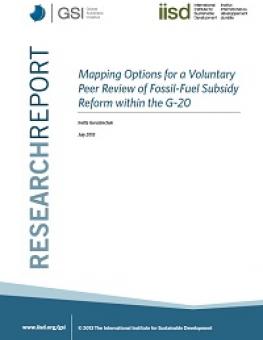
Mapping Options for a Voluntary Peer Review of Fossil-Fuel Subsidy Reform within the G-20
This briefing presents options for a voluntary peer-review process within the G-20 and elsewhere for discussion at a roundtable event with members of the G-20, APEC and Friends of Fossil Fuel Subsidy Reform.
The briefing aims to identify feasible, short-term options for establishing a voluntary peer-review process within the political constraints of the G-20 commitment to reduce fossil-fuel subsidies.
The paper draws on a review of documents from the G-20 and other international forums, policy-research reports, academic literature and expert interviews.
Participating experts
You might also be interested in
The Cost of Fossil Fuel Reliance
Government support for fossil fuels reached at least USD 1.5 trillion in 2023, new data shows.
Increased Support Needed to Achieve India's Clean Energy Goals
India is on track to achieve many of its 2030 clean energy goals but needs to step up government support measures to accelerate the deployment of offshore wind, electric vehicles, and green hydrogen, according to a new report.
Ending Export Credits for Oil and Gas: How OECD countries can end 2024 with a climate win
For a year now, Organisation of Petroleum Exporting Countries (OECD) governments have been negotiating an agreement that could put an end to oil and gas export finance. Following the acrimony in Baku, this would be a very real way for the OECD to show policy coherence, respond to calls from the poorest countries to stop subsidizing fossil fuels, and shift public finance to solutions.
Fossil Fuel Production, Renewable Energy, and Subsidy Reform in Nationally Determined Contributions 3.0
This policy brief provides an analysis of the critical benchmarks and recommendations necessary for aligning nationally determined contributions (NDCs) with the 1.5 °C target.